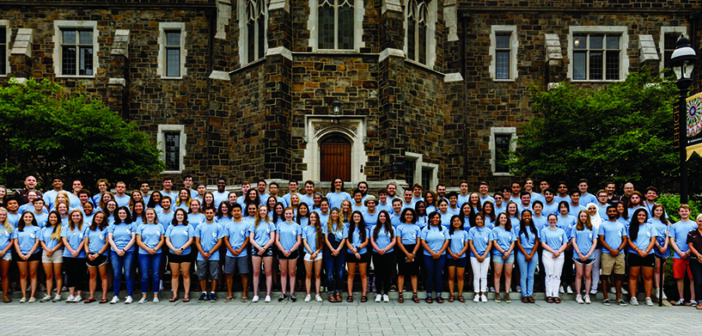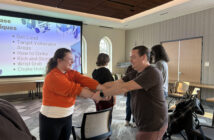With reduced COVID-19 protocols compared to prior semesters, second-year Gryphons have experienced differences in their roles as resident assistants.
Danielle Picarello, ‘22, a Gryphon in Farrington Square, said it has been nice to see her residents on campus, which has allowed her to become more familiar with their faces.
Picarello said she felt out of the loop with what policies Gryphons were expected to enforce last school year and felt that information was not always communicated to them by Lehigh in a clear and timely manner.
“My job was harder last year also because we were kind of thought of as the COVID-19 patrol,” Picarello said. “It felt like the Lehigh administration saw us as that. They wanted us to enforce a lot of the policies. A lot of us didn’t feel prepared for that big of a task.”
Laura Duffany, ‘23, head Gryphon for McClintic-Marshall House and Taylor House, said last year many of the Gryphons did not find out information regarding university protocol until the whole student body did. She said having a streamlined communication process between the administration and the Gryphons would make things easier for everyone.
Nada Younies, ‘22, a Gryphon in Upper Cents, said working with the Gryphon staff this year has made their jobs more rewarding. She said the increased collaboration has also made their jobs easier.
Picarello said being able to have in-person meetings and training with the other Gryphons has brought them closer.
“We are here as rule enforcers, and we are there to tell (residents) when they are messing up, but we are also there to be a form of support to them,” Duffany said. “They shouldn’t be scared of us. We are all students, we are all here for the same reason. Gryphons are really supposed to be a resource.”
Younies said the most significant difference she has observed this year is with community-building. She said it has been easier to create a sense of togetherness and belonging within residence halls because they are able to do more in person.
“Simply having conversations with our residents (last year), things couldn’t be face-to-face,” Younies said. “Having to do a lot of things virtually put a strain on creating that community.”
Duffany said last year some of her residents struggled to make connections online, which had an impact on their mental health. This made her role more challenging because her residents depended on the residence hall to meet others, and as a Gryphon, she was relied upon to help facilitate those connections.
Duffany said last year, residence halls played a greater role in forming social connections because traditional ways of meeting people, such as in the dining hall or in class, were not an option.
“Last year it was much easier to connect with the residents on my floor because I felt like there were so few of us that we all had to talk or else things would be awkward,” Duffany said. “This year there are so many of us that it doesn’t really matter if we don’t see each other everyday. It’s not as quiet in the hallways, so we’re always interacting, whether directly or indirectly. Last year everyone had to make an effort to get to know each other.”






Comment policy
Comments posted to The Brown and White website are reviewed by a moderator before being approved. Incendiary speech or harassing language, including comments targeted at individuals, may be deemed unacceptable and not published. Spam and other soliciting will also be declined.
The Brown and White also reserves the right to not publish entirely anonymous comments.